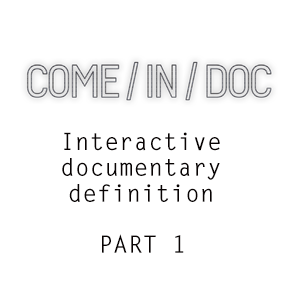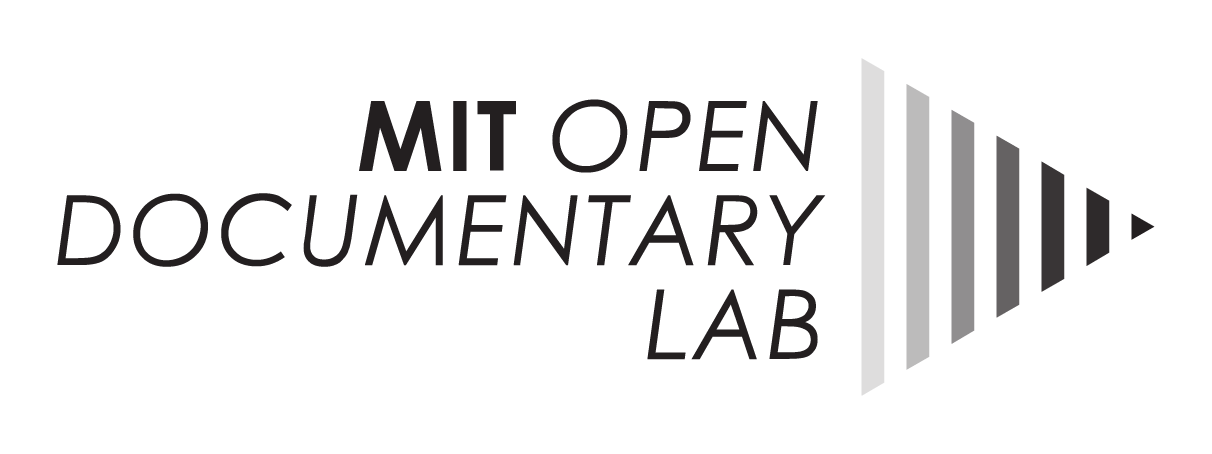
28 Apr COME/IN/DOC | Interactive Documentary Definition [Part 1]
SEASON 1 – EPISODE 3 – PART 1: ‘INTERACTIVE DOCUMENTARY DEFINITION’
Here you can access the first part of the third episode:
[vimeo width=”580″ height=”330″]https://vimeo.com/163979828[/vimeo]
SELECTION OF KEY IDEAS (DIRECTOR’S CONTRIBUTION)
Andre Almeida (Film Director): If you put two filmmakers in the same room they will spend the whole time arguing about what a documentary is, and I think this would be true for the interactive documentary as well. One definition could be the impossibility of defining it. It is such a new idea…
Alexandre Brachet (Upian): We don’t care about the web, TV or cinema, we are making ‘documentary’.
Christopher Allen (UnionDocs): I define it as a form of nonfiction storytelling or experience that gives the audience an active role.
Brenda Longfellow (Offshore): In interactive documentary, the author has a different relationship with the user. It’s not a question that can be answered right now…it’s a very new field and therefore there’s not a canon of projects. Concepts of intimacy, choice and engagement are central here…
Mark Atkin (Crossover Labs): It could be many many things, because we have to include the user experience, videogames, etc.
Claire Leproust (Fablabchannel): I would say it is everything that could provide the user with an experience.
Nonny de la Peña (Emblematic Group): An interactive documentary is one in which the viewer is able to engage with the material. I call it ‘participatory experiences’ in immersive journalism.
Arnaud Dressen (Honkytonk Films): It is not a genre, it is just another way of looking at documentary storytelling. There’s an evolution of documentary storytelling in which technology plays a big part.
Yasmin Elayat (18 Days in Egypt): It is a story that does not have a closed structure, instead of being passive you are active and have the choice to explore the world.
Jonathan Harris (Number 27): It’s something that explores a certain topic that exists in the world in a nonfictional way and allows some degree of agency and control for the viewer.
Katie Edgerton (MIT Open Documentary Lab Alumni): I would say it is a story based on some kind of reality, but there’s a lot of new things that make this field so exciting right now…
Robert K. Logan (University of Toronto): An interactive text with hyperlinks that allows the user to explore other ideas.
Bjarke Myrthu (Blind Spot): It’s nonlinear and has elements that break the traditional narrative timeline.
Paulina Tervo (writethisdown): An i-doc is a project which doesn’t need to be linear, doesn’t have to have a traditional angle, it could be a series of stories, and it doesn’t follow the usual rules. The audience can interact with the content. It can be any media, so it’s not focused on film, but rather a combination of different media.
Katerina Cizek (Highrise): The definition is kind of limiting and problematic. Over recent years there has been an incredible explosion in storytelling, the web and the ways we interact. Summing up, the form offers new ways of considering the role of the storyteller in the world.
Add your contribution here: http://comeindoc.com/contribute/
Website: http://comeindoc.com
Dr. Arnau Gifreu
COME/IN/DOC Director
Research affiliate
agifreu@mit.edu



